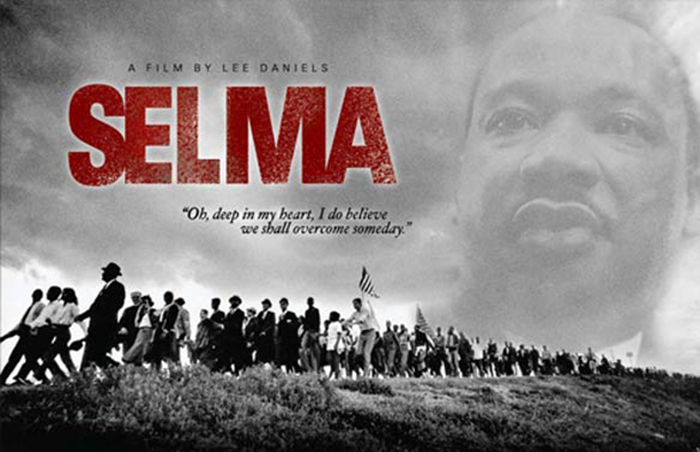"But Peter and the other apostles answered and said: “We ought to obey God rather than men."
Acts 5:29
Regular readers won't be surprised to learn that a film which gave the U.T. administration
a conniption fit caught our attention. Furthermore, we understand the need to set the
historical record straight about Lyndon Johnson. Ava Duvernay's masterpiece,
Selma, does not disappoint.
Selma catalogs
the 1965 campaign designed to make voting rights too politically hot for Lyndon Johnson to ignore. At the time, despite passage of
the 1964 Civil Rights act (which Johnson
obstructed in 1957), local officials in Dixiecrat states enacted absurdly high barriers to voter registration. Johnson was determined to ignore the situation so that he could focus his political capital on
creating new entitlements and
expanding the war in Vietnam.
Martin Luther King Jr., who led the campaign, chose to stand in Selma for political reasons. The Dixiecrat county government, which controlled voter registration,
was notoriously hostile to civil rights. At the same time, the
image-conscious City of Selma was (
relatively) sympathetic to the protesters (
most of the time). This dynamic enabled organizers to move (
relatively) freely in the city while setting up the county courthouse as a media friendly setting for a confrontation with
Dixiecrat county sheriff Jim Clark (who controlled access to the voter registration office). Nonetheless, King's presence was
not universally welcomed among local activists.
Selma uses FBI monitoring of King (originally ordered
by Bobby Kennedy) as a plot device. In the film, Lyndon Johnson specifically orders the FBI
to find out "what Martin Luther King intends to do next." The film depicts events like the murder of
Jimmie Lee Jackson (enabled by Dixiecrat Governor George Wallace),
Turnaround Tuesday, and
the murder of James Reeb with a precision for which a seven paragraph review cannot do justice. From the
Dallas County Courthouse, to the
Edmund Pettus bridge, to
the Alabama Statehouse,
Selma illustrates King's masterful use of the court of public opinion. Eventually, of course, events on the ground
forced Lyndon Johnson to move on King's issue.
While
Selma portrays King favorably, the film is not hagiographic. The film deals openly with
King's serial adultery. One of the most poignant scenes in the film depicts Coretta Scott King's heartbreak upon receiving proof of her husband's dalliances. Even here, however, the villany of Lyndon Johnson and his FBI is evident. Johnson ordered the FBI to send the (illegally obtained) recording to King's wife in a (vain) attempt to intimidate King into abandoning the Selma campaign.
One artistic note: in addition to it's moving plot,
Selma's cinematography is spectacular. While the scenes where people were beaten were tragic, they were an artistic
tour de force that leaves the viewer feeling like events are less than 10 feet away. This author can only imagine the painstaking labor that went into finding costumes, props, and vehicles consistent with this 1965 period piece.
Public opinion is the most powerful weapon activists can use to change government policy. Unfortunately, it is also extremely difficult to mobilize. In 1965, Martin Luther King Jr. and his allies masterfully choreographed their Alabama campaign to force a recalcitrant Lyndon Johnson to move on their issues. Ava Duvernay's
Selma is essential viewing for anyone serious about changing government policy. Make them feel the heat until they see the light.
-----
The preview below is an accurate representation of the film:


































